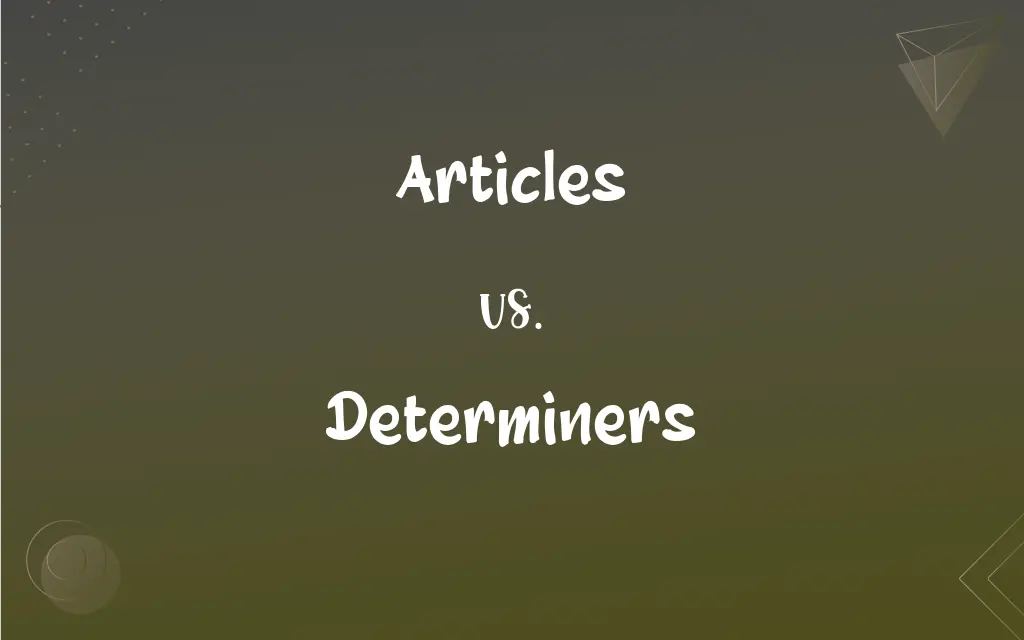Articles vs. Determiners: What's the Difference?
Edited by Janet White || By Harlon Moss || Published on August 23, 2024
Articles are a subset of determiners, specifically 'the', 'a', and 'an', indicating specificity of nouns; determiners include articles, possessives, demonstratives, etc., defining or limiting nouns.

Key Differences
Articles, which include 'the', 'a', and 'an', are used to indicate the definiteness or indefiniteness of a noun. Determiners, a broader category, include articles but also encompass possessive pronouns, demonstrative adjectives, and quantifiers, which serve to specify or limit a noun in different ways. Both play crucial roles in clarifying the meaning of nouns in sentences.
Articles are limited to three types in English: the definite article 'the', and the indefinite articles 'a' and 'an'. Determiners, on the other hand, come in various forms such as possessive pronouns ('my', 'your'), demonstratives ('this', 'those'), quantifiers ('some', 'many'), and numbers ('one', 'two'). This variety allows determiners to provide more specific information about the nouns they modify than articles can.
The use of articles is governed by specific rules related to the noun's definiteness, countability, and initial sound. Determiners have a broader range of usage, determined not only by definiteness but also by possession, quantity, proximity, and other factors. Both articles and determiners must agree with their nouns in number and sometimes in gender.
Articles are essential for identifying the presence and specificity of a noun, while determiners extend this role by providing additional context or information about the noun. Both are integral to English grammar, aiding in the formation of coherent and precise sentences.
In the sentence "The dog barked," 'the' is an article specifying a particular dog. In "My dog barked," 'my' is a determiner indicating possession. Both articles and determiners thus modify nouns but in distinct ways, with articles being more general and determiners more specific.
ADVERTISEMENT
Comparison Chart
Types
'The', 'a', 'an'
Possessives, demonstratives, quantifiers, numbers, articles
Function
Indicate definiteness of nouns
Define or limit nouns in various ways
Variety
Limited to three
Broad range including various classes
Usage Rules
Governed by noun’s definiteness and countability
Governed by possession, quantity, proximity, definiteness
Examples in Sentences
"The cat," "A book," "An apple"
"My cat," "This book," "Some apples", "Three books"
ADVERTISEMENT
Articles and Determiners Definitions
Articles
Articles help to convey whether we’re referring to something specific or something more general.
The sun is bright today.
Determiners
Determiners are words placed in front of nouns to specify quantity or ownership.
My book is on the table.
Articles
Articles are words that define a noun as specific or unspecific.
The dog is barking.
Determiners
Determiners can indicate the specific item being referred to.
This dog is friendly.
Articles
Articles include 'the' (definite) and 'a' or 'an' (indefinite).
A cat sat on the mat.
Determiners
Determiners provide context about the noun, such as who owns it or how much there is.
Some people prefer tea over coffee.
Articles
Articles precede nouns to indicate the type of reference being made.
An apple a day keeps the doctor away.
Determiners
Determiners include articles, possessive pronouns, and demonstrative adjectives.
Those apples are ripe.
Articles
Articles are essential components of English grammar for clarity and precision.
I read a book yesterday.
Determiners
Determiners are critical for providing details about the nouns they precede.
Every student passed the test.
Articles
An individual thing or element of a class; a particular object or item
An article of clothing.
Articles of food.
Determiners
One that determines.
Determiners
(Grammar) A word belonging to a group of noun modifiers, which includes articles, demonstratives, possessive adjectives, and words such as any, both, or whose, and, in English, occupying the first position in a noun phrase or following another determiner.
Determiners
Plural of determiner
FAQs
What is a determiner?
A determiner is a word placed before a noun to clarify its meaning by indicating things like definiteness, quantity, possession.
What is an example of a determiner?
"My cat is playful" - 'my' is a determiner indicating possession.
Can you give an example of an article?
"The cat sat on the mat" - 'the' is an article specifying a particular cat.
How do articles affect the meaning of a sentence?
Articles affect whether a noun is seen as specific ('the') or one of a general kind ('a', 'an').
Why are articles important in English?
Articles are important for clarity, indicating whether we are referring to a specific or general item.
What types of determiners are there besides articles?
Besides articles, determiners include possessives, demonstratives, quantifiers, and numbers.
Can determiners be omitted in a sentence?
In some cases, determiners can be omitted, especially in informal speech or certain languages.
What are articles in English grammar?
Articles are words ('the', 'a', 'an') that define a noun as specific or unspecific.
Are all determiners articles?
No, all articles are determiners, but not all determiners are articles.
Can the use of a wrong article change the sentence meaning?
Yes, using the wrong article can change the meaning of a sentence by altering the noun's specificity.
Are determiners necessary in all sentences?
Most sentences with nouns will include determiners, but there are exceptions, especially in poetic or stylized language.
What role do determiners play in a sentence?
Determiners provide context like quantity, possession, specificity, or identity about the nouns they precede.
Do articles change according to the noun?
Yes, articles change based on the noun’s initial sound ('a' or 'an') and specificity ('the').
Is 'the' always used with specific nouns?
'The' is used with specific nouns that are known to the speaker and listener.
Do demonstratives qualify as determiners?
Yes, demonstratives like 'this', 'that', 'these', and 'those' are determiners indicating specific items.
Can a noun have more than one determiner?
Generally, a noun has one determiner, which can be an article, possessive pronoun, quantifier, etc.
How does 'a' differ from 'an' as an article?
'A' is used before words starting with a consonant sound, 'an' before vowel sounds.
Are articles used in all languages?
No, not all languages use articles; their presence and usage vary across languages.
How do quantifiers as determiners work?
Quantifiers, a type of determiner, indicate the amount or quantity of the noun, like 'some' or 'many'.
Can the absence of an article be meaningful?
Yes, omitting an article can imply generality or abstractness, as in "Life is unpredictable".
About Author
Written by
Harlon MossHarlon is a seasoned quality moderator and accomplished content writer for Difference Wiki. An alumnus of the prestigious University of California, he earned his degree in Computer Science. Leveraging his academic background, Harlon brings a meticulous and informed perspective to his work, ensuring content accuracy and excellence.
Edited by
Janet WhiteJanet White has been an esteemed writer and blogger for Difference Wiki. Holding a Master's degree in Science and Medical Journalism from the prestigious Boston University, she has consistently demonstrated her expertise and passion for her field. When she's not immersed in her work, Janet relishes her time exercising, delving into a good book, and cherishing moments with friends and family.






































































